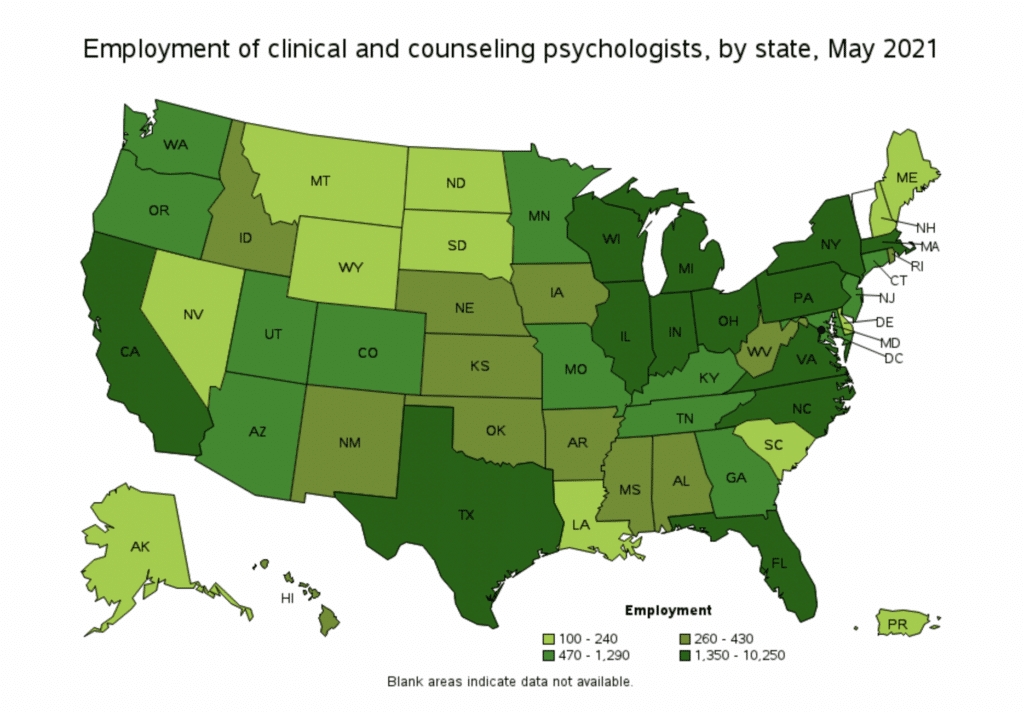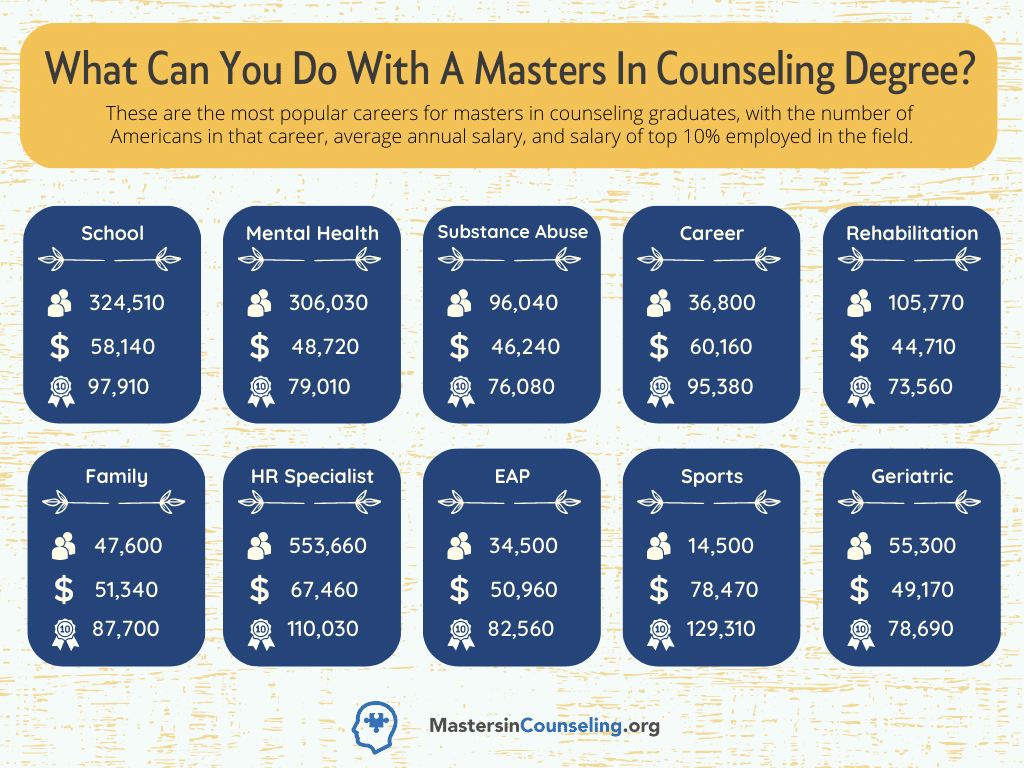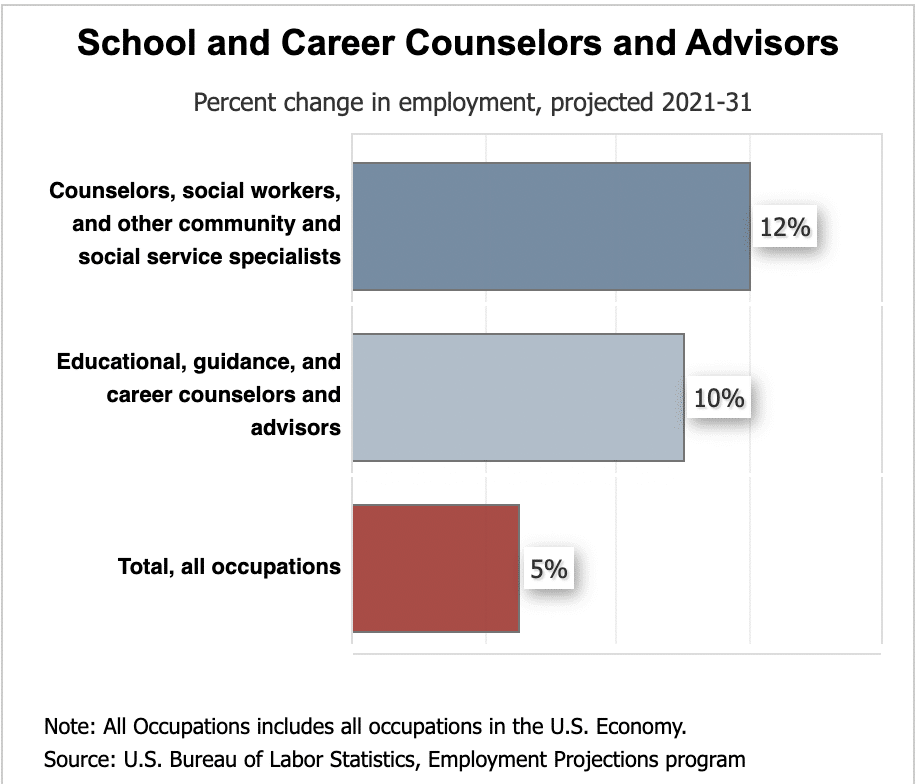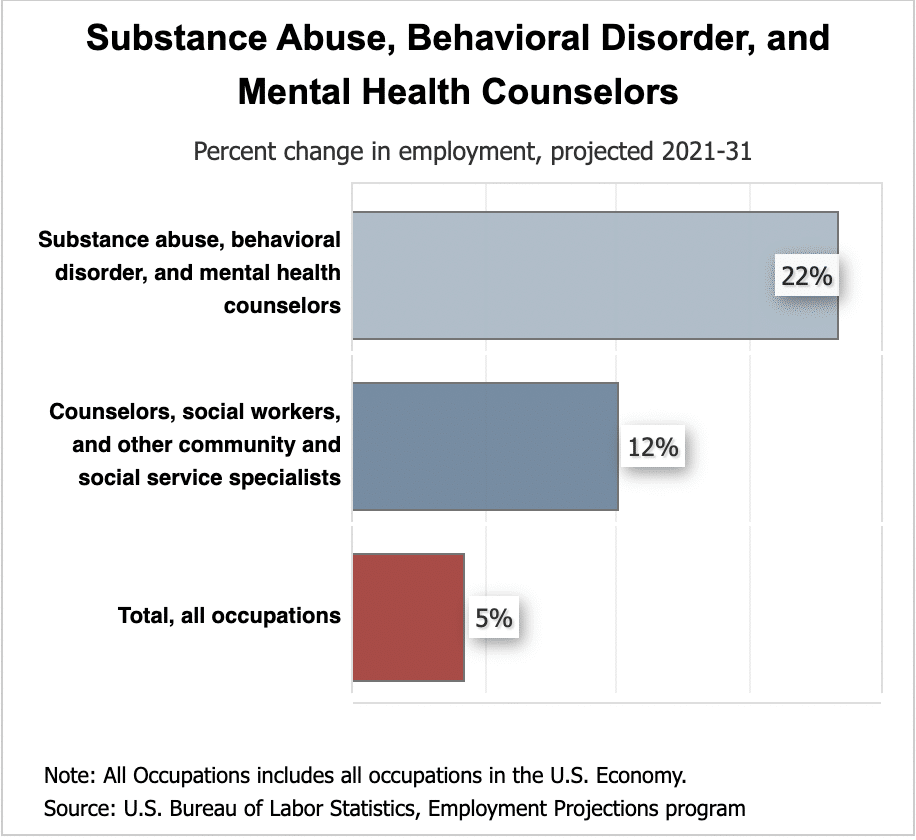
Masters In Counseling Careers
More Answers From Masters In Counseling Graduates
Did You Know?
Counseling jobs are expected to grow 7 to 25% by 2031, much faster than the national average.
Best Online Masters in Counseling Programs
Want More Options? See Our Directory of Masters in Counseling Programs
Career Overview
Quick Links About Counseling Careers
What Can You Do With A Masters Degree in Counseling?
Counseling is an extremely broad field with a wide range of careers spanning almost the entire economy. Here are the most common careers for people with a masters degree in counseling, which masters in counseling degree leads to that career, and list the average salary, salary range, and number of people employed in the US in each of those careers.
- Clinical Mental Health Counselor: A Clinical Mental Health Counselor provides mental health services to individuals and groups to improve their mental and emotional wellbeing.
- Degree: Master of Science in Clinical Mental Health Counseling
- Average Salary: $49,950 – $82,500,
- Salary Range: $34,600 – $113,240,
- Employed: 332,700.
- School Counselor: A School Counselor assists students with personal, social, and academic development, helping them with career planning and academic achievement.
- Degree: Master of Education in School Counseling
- Average Salary: $47,600 – $79,420,
- Salary Range: $34,380 – $97,910,
- Employed: 333,500.
- Substance Abuse and Behavioral Disorder Counselor: A Substance Abuse and Behavioral Disorder Counselor helps people who suffer from addiction or other behavioral problems.
- Degree: Master of Science in Substance Abuse Counseling
- Average Salary: $46,240 – $71,280,
- Salary Range: $30,850 – $94,850,
- Employed: 87,000.
- Marriage and Family Therapist: A Marriage and Family Therapist helps individuals, couples, and families to improve their relationships and cope with emotional and mental disorders.
- Degree: Master of Science in Marriage and Family Therapy
- Average Salary: $54,590 – $90,640,
- Salary Range: $32,050 – $129,250,
- Employed: 56,700.
- Rehabilitation Counselor: A Rehabilitation Counselor helps people with disabilities to live independently and participate fully in their communities.
- Degree: Master of Science in Rehabilitation Counseling
- Average Salary: $37,930 – $62,120,
- Salary Range: $25,760 – $81,380,
- Employed: 114,300.
- Psychologist: A Psychologist studies mental processes and behavior, and provides counseling services to individuals and groups.
- Degree: Masters of Philosophy in Counseling Psychology
- Average Salary: $78,180 – $132,070,
- Salary Range: $45,380 – $167,610,
- Employed: 181,700.
- Social Worker: A Social Worker helps individuals, families, and communities to cope with social and emotional issues.
- Degree: Master of Social Work
- Average Salary: $50,470 – $81,400,
- Salary Range: $31,750 – $124,040,
- Employed: 713,200.
- Military Counselor: A Military Counselor provides counseling services to military personnel and their families to address the unique challenges of military life.
- Degree: Master of Science in Counseling with a focus on military counseling
- Average Salary: $49,200 – $81,970,
- Salary Range: $32,620 – $128,110,
- Employed: 115,700.
- Grief Counselor: A Grief Counselor helps individuals and families cope with loss and grief, providing support and guidance through the grieving process.
- Degree: Master of Science in Counseling with a focus on grief counseling
- Average Salary: $49,200 – $81,970,
- Salary Range: $32,620 – $128,110,
- Employed: 115,700.
- Eating Disorder Counselor: An Eating Disorder Counselor helps individuals struggling with eating disorders to develop healthier relationships with food and their bodies, providing support and guidance through the recovery process.
- Degree: Master of Science in Counseling with a focus on eating disorders
- Average Salary: $49,200 – $81,970,
- Salary Range: $32,620 – $128,110,
- Employed: 115,700.
- Child Counselor: A Child Counselor provides counseling services to children and adolescents to address behavioral, emotional, and developmental issues.
- Degree: Master of Science in Counseling with a focus on child counseling
- Average Salary: $44,840 – $74,790,
- Salary Range: $28,240 – $100,610,
- Employed: 320,800.
- Art Therapist: An Art Therapist helps clients to explore their feelings and emotions through art, using the creative process as a means of self-expression and personal growth.
- Degree: Master of Arts in Art Therapy
- Average Salary: $44,000 – $75,410,
- Salary Range: $28,560 – $121,020,
- Employed: 39,800.
- Geriatric Counselor: A Geriatric Counselor works with the elderly and their families to provide emotional and social support, help with health and wellness issues, and facilitate communication.
- Degree: Master of Science in Gerontology
- Average Salary: $47,880 – $79,840,
- Salary Range: $30,830 – $120,610,
- Employed: 136,500.
- Forensic Counselor: A Forensic Counselor provides counseling services to individuals involved in the criminal justice system, including victims, witnesses, and offenders.
- Degree: Master of Science in Forensic Psychology
- Average Salary: $42,760 – $71,000,
- Salary Range: $27,510 – $100,610,
- Employed: 669
- Career Counselor: A Career Counselor helps people make informed career decisions, develop job search skills, and navigate workplace issues.
- Degree: Master of Science in Counseling with a focus on Career Counseling
- Average Salary: $46,360 – $77,510,
- Salary Range: $30,690 – $102,950,
- Employed: 57,200.
- Clinical Psychologist: A Clinical Psychologist assesses, diagnoses, and treats individuals with mental illness, emotional disturbances, or behavior disorders.
- Degree: Doctor of Psychology in Clinical Psychology
- Average Salary: $82,760 – $137,590,
- Salary Range: $45,380 – $177,160,
- Employed: 181,700.
- Mental Health Counselor: A Mental Health Counselor provides counseling services to individuals, families, and groups to address mental and emotional issues.
- Degree: Master of Science in Mental Health Counseling
- Average Salary: $44,840 – $74,790,
- Salary Range: $28,240 – $100,610,
- Employed: 320,800.
- Community Counselor: A Community Counselor works in a community-based setting to provide counseling and support services to individuals and families.
- Degree: Master of Science in Community Counseling
- Average Salary: $43,390 – $72,420,
- Salary Range: $29,840 – $101,480,
- Employed: 15,900.
- Play Therapist: A Play Therapist uses play-based techniques to help children express their feelings, cope with emotional issues, and develop social skills.
- Degree: Master of Arts in Play Therapy or a Master of Science in Counseling with a focus on play therapy
- Average Salary: $44,000 – $75,410,
- Salary Range: $28,560 – $121,020,
- Employed: 39,800.
- Psychotherapist: A Psychotherapist provides individual and group therapy to address mental and emotional issues.
- Degree: Master of Science in Counseling with a focus on psychotherapy
- Average Salary: $49,200 – $81,970,
- Salary Range: $32,620 – $128,110,
- Employed: 115,700.
Where Do Counselors Work?
There are approximately 1,100,000 counselors employed in the United States, across a very wide range of professions. And the diversity of professions is reflected in the wide array of settings in which they work, including hospitals, federal and state governments, outpatient care centers, elementary and secondary schools, and more. The largest employers of counselors as of May 2021 were:
- Outpatient Care Centers – 22%
- Individual and Family Services – 16%
- Residential Intellectual and Developmental Disability, Mental Health, and Substance Abuse Facilities – 11%
- Elementary and Secondary Schools – 10%
- Local Government (Excluding Education and Hospitals) – 7%
- State Government (Excluding Education and Hospitals) – 6%
- Hospitals (State, Local, and Private) – 5%
- Colleges, Universities, and Professional Schools – 4%
- Nursing Care Facilities (Skilled Nursing Facilities) – 3%
- Employment Services – 2%

What Is The Employment Outlook For Counselors?
The overall employment outlook for masters in counseling degree holders is positive, with almost every field outpacing the average growth in the US economy generally. But the rate of projected job growth varies significantly depending on which counseling career path you plan to follow. Here are some of the most common careers for masters degree in counseling graduates, and the projected employment growth of those careers over the next decade (source BLS.gov):
- School and Career Counselors: 8% projected growth.
- Substance Abuse, Behavioral Disorder, and Mental Health Counselors: 25% projected growth.
- Marriage and Family Therapists: 25% projected growth.
- Rehabilitation Counselors: 10% projected growth.
- Clinical, Counseling, and School Psychologists: 3% projected growth.
- Mental Health and Substance Abuse Social Workers: 13% projected growth.
- Health Educators and Community Health Workers: 13% projected employment growth.
- Medical and Health Services Managers: 32% projected employment growth.
- Training and Development Managers: 7% projected employment growth.
- Human Resources Specialists: 7% projected employment growth.

The map to the left shows the concentration of clinical and counseling psychologists employed by state (source: BLS Clinical and Counseling Psychologists, 2020).
It shows that counselors are well represented in every state, and are one of the most evenly distributed careers. That means that not only are there counseling career opportunities across the country, but that the career offers a lot of geographic flexibility, should you decide to relocate later in your career.
Internship and Practicum Requirements To Get Your Degree
Many masters in counseling degree programs require students to complete an internship and / or practicum as part of their coursework, as a requirement to completing their masters degree in counseling program. These internships or practicums typically involve working in a clinical setting under the supervision of a licensed counselor or other mental health professional. Here are a few examples of the internship and practicum requirements of some masters in counseling programs so that you will have an idea of what you can expect.
- University of Colorado Denver: The Master of Arts in Counseling program at the University of Colorado Denver requires students to complete a 700-hour practicum and a 600-hour internship. The practicum is completed in the second semester of the program and the internship is completed in the final year.
- University of North Carolina at Chapel Hill: The Master of Arts in Clinical Mental Health Counseling program at the University of North Carolina at Chapel Hill requires students to complete a 600-hour internship in a mental health agency or setting. The internship is typically completed in the final year of the program.
- Loyola University Chicago: The Master of Arts in Counseling program at Loyola University Chicago requires students to complete a 100-hour practicum and a 600-hour internship. The practicum is completed in the first year of the program and the internship is completed in the second year.
- University of Southern California: The Master of Marriage and Family Therapy program at the University of Southern California requires students to complete a 500-hour practicum and a 1,000-hour internship. The practicum is typically completed in the second semester of the first year and the internship is typically completed in the second year.
Supervised Clinical Experience Requirements To Get Licensed
In order to become licensed as a counselor in your state, typically, you’ll need to complete a certain number of hours of supervised clinical experience. This might involve working with clients under the supervision of a licensed counselor or other mental health professional. Each state varies in their requirements, but to provide you with an idea of what you can expect, here are a few individual states’ counseling licensure requirements:
- California: In California, candidates for licensure as a Licensed Professional Clinical Counselor (LPCC) must complete at least 3,000 hours of supervised experience in the practice of professional clinical counseling. Of these hours, at least 1,750 must be direct counseling experience with clients.
- New York: In New York, candidates for licensure as a Licensed Mental Health Counselor (LMHC) must complete at least 3,000 hours of post-graduate supervised experience in the practice of mental health counseling. Of these hours, at least 1,500 must be direct client contact.
- Texas: In Texas, candidates for licensure as a Licensed Professional Counselor (LPC) must complete at least 3,000 hours of supervised experience in the practice of professional counseling. Of these hours, at least 1,500 must be direct client contact.
- Florida: In Florida, candidates for licensure as a Licensed Mental Health Counselor (LMHC) must complete at least 1,500 hours of supervised experience in the practice of mental health counseling. Of these hours, at least 100 must be supervised directly by a licensed supervisor.
Of note, each state’s requirements to become a licensed counselor are different, so it is important that you research your specific state’s requirements.
Continuing Education Requirements To Maintain Your License
Once you have your counseling license, in most states you will need to complete a certain number of continuing education hours every few years in order to maintain your license. Each state is different, but to give you an idea of what you can expect here are the counseling continuing education requirements of a few states:
- California: Licensed Professional Clinical Counselors (LPCCs) in California are required to complete 36 hours of continuing education (CE) every two years. Of these 36 hours, at least 6 hours must be in law and ethics.
- New York: Licensed Mental Health Counselors (LMHCs) in New York are required to complete 36 hours of continuing education every three years. Of these 36 hours, at least 12 must be in the diagnosis and treatment of mental illness.
- Texas: Licensed Professional Counselors (LPCs) in Texas are required to complete 24 hours of continuing education every two years. Of these 24 hours, at least 4 must be in professional ethics and at least 3 must be in cultural diversity.
- Florida: Licensed Mental Health Counselors (LMHCs) in Florida are required to complete 30 hours of continuing education every two years. Of these 30 hours, at least 3 must be in ethics and at least 2 must be in medical errors.
What Our Experts Say About Masters In Counseling Careers
So I think definitely I was inspired by wanting to help people and always really had an interest in this emerging adolescent’s coming of age population. I got a master’s in counseling because I really wanted to work with children, but I did not want to be a teacher. And I started working with children in various nonprofits and I really enjoyed the guidance perspective of it. And that led me to pursue a master’s in counseling because in most states you do have to have a master’s to become a school counselor.

You can get a job in a variety of settings, which include schools like a school counselor or guidance counselor. You can work in a clinical setting, which is usually like a family marriage, couples counseling type clinic. And you can also work in a college setting, whether it’s in the mental health clinic, on a campus or in career counseling or academic advising.

I love the moments when you’re working with a client and they suddenly put things together and just like there’s a weight that’s lifted. But then also the, you know, like Oprah Winfrey calls it the ‘aha’ moment, and I love watching that process.








